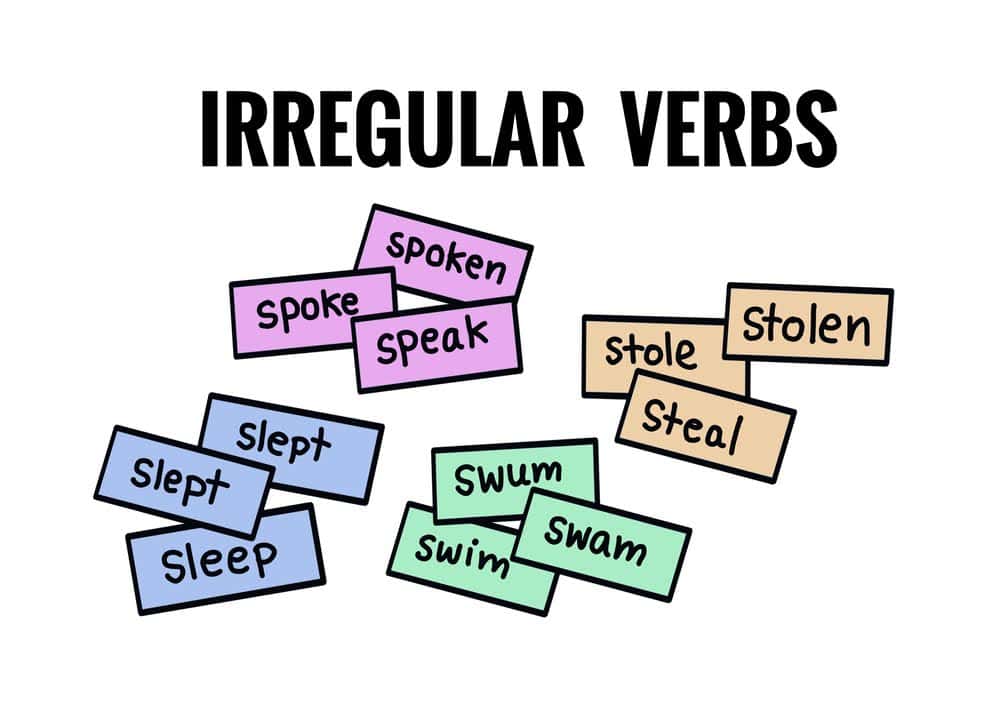“Just add -ed to a verb and you will have its past tense.”
But then go turns into went, eat becomes ate, and the rules don’t seem to be applicable anymore. That’s just how irregular verbs are.
They are unpredictable, inconsistent, and often memorized more out of frustration than logic.
You can learn the rules, follow the patterns, and still get blindsided by words like taught, swum, or bought.
There’s no formula, no shortcut.
Let’s end your misery. In this blog, I’ll give you a full list of irregular verbs, examples, and ways to use them correctly.
Key Takekaways
- Irregular verbs do not follow the usual “-ed” rule for past tense, which makes them harder to predict and learn.
- Some irregular verbs follow loose patterns, but many do not follow any pattern at all.
- To use irregular verbs correctly, it is important to learn their three main forms: base form, past simple, and past participle.
- The best way to learn irregular verbs is through regular practice, reading, and listening, rather than just memorizing long lists.
What Are Irregular Verbs?

Irregular verbs are verbs that don’t follow the usual rules when changing from the present to the past tense or past participle.
Most English verbs are “regular.” You just add -ed to make the past tense. For example:
- walk → walked
- clean → cleaned
Simple, right?


Never Worry About AI Detecting Your Texts Again. Undetectable AI Can Help You:
- Make your AI assisted writing appear human-like.
- Bypass all major AI detection tools with just one click.
- Use AI safely and confidently in school and work.
But irregular verbs don’t follow these rules. They change in ways that aren’t predictable, and sometimes they don’t change at all.
Examples:
- go → went → gone
- eat → ate → eaten
- cut → cut → cut
Unfortunately, you can’t memorize them using a fixed pattern.
The only real way to learn irregular verbs is through exposure, practice, and repetition.
Common Patterns and Non-Patterns
One of the most confusing things about irregular verbs is that… well, they’re irregular. There’s no single rule that works for all of them.
But that doesn’t mean they’re completely random either.
Some irregular verbs actually follow loose patterns. Here are a few you might notice:
Pattern 1: All Three Forms Are the Same
These verbs don’t change at all.
- cut – cut – cut
- put – put – put
- let – let – let
Easy to remember. And thankfully, there are quite a few of these.
Pattern 2: Only the Vowel Changes
The beginning and ending stay the same, but the middle vowel changes.
- drink – drank – drunk
- sing – sang – sung
- begin – began – begun
Pattern 3: “-t” Endings Instead of “-ed”
Some verbs change by ending in -t instead of -ed.
- keep – kept – kept
- sleep – slept – slept
- feel – felt – felt
This group looks similar to regular verbs but has a twist at the end.
But Then… the Rule-Breakers
Of course, there are irregular verbs that refuse to follow any pattern.
- go – went – gone
- be – was/were – been
- do – did – done
These are the ones that confuse everyone, even native speakers sometimes.
The Three Main Verb Forms
To use verbs correctly in English, especially irregular ones, you need to know their three main forms.
These are the building blocks of everyday speech and writing.
If you understand how and when to use each one, a lot of grammar suddenly becomes much easier.
1. Base Form (Infinitive without to)
This is the simplest form of the verb, i.e., the one you’d look up in a dictionary. Examples:
- go
- take
- run
- know
You use the base form in several places:
- In the present tense with I, you, we, and they:
They run every morning. - After modal verbs like can, will, must:
She can take the train. - After to when forming the infinitive:
I want to know more.
As you can see, even though it’s the “default” form, it’s used in lots of situations.
2. Past Simple (V2)
This form shows that an action happened in the past and is now finished.
With regular verbs, you usually just add -ed (walk → walked), but with irregular verbs, the change can be anything… or nothing at all.
Examples:
- went (from go)
- took (from take)
- ran (from run)
- knew (from know)
3. Past Participle (V3)
This is the most trouble-causing form because it is not used alone. You have to pair it with helping verbs, i.e., has, have, had, is, was, been, or being.
- gone (from go)
- taken (from take)
- run (from run)
- known (from know)
Undetectable AI’s Grammar Checker does a great job at telling apart different verb forms and using them appropriately.
Do give it a shot if you ever hit a wall!

Full Irregular Verb List (Grouped)
Have you ever thought about how many irregular verbs are in English language?
Well, I did (apparently I have way too much free time on my hands!).
Guess what? There are 200.
Some are common and used daily, like go, come, see, eat, and make. Others are rare or old-fashioned, like befall or hew, which you might only see in literature or poetry.
But you don’t need to memorize all 200 of them as long as you focus on the most frequently used irregular verbs first.
Common Irregular Verbs (Top 50)
- be – was/were – been
- have – had – had
- do – did – done
- say – said – said
- go – went – gone
- get – got – gotten/got (US/UK)
- make – made – made
- know – knew – known
- think – thought – thought
- take – took – taken
- see – saw – seen
- come – came – come
- want – wanted – wanted (Regular, but worth mentioning)
- give – gave – given
- find – found – found
- tell – told – told
- ask – asked – asked (Also regular)
- become – became – become
- show – showed – shown
- leave – left – left
- feel – felt – felt
- put – put – put
- bring – brought – brought
- begin – began – begun
- keep – kept – kept
- hold – held – held
- write – wrote – written
- sit – sat – sat
- stand – stood – stood
- hear – heard – heard
- let – let – let
- mean – meant – meant
- run – ran – run
- read – read – read (pronounced “red” in past forms)
- move – moved – moved (Regular, but common)
- pay – paid – paid
- meet – met – met
- set – set – set
- lead – led – led
- understand – understood – understood
- speak – spoke – spoken
- lose – lost – lost
- spend – spent – spent
- cut – cut – cut
- grow – grew – grown
- send – sent – sent
- build – built – built
- fall – fell – fallen
- drive – drove – driven
- choose – chose – chosen
Alphabetical List (For Reference)
- be – was/were – been
- become – became – become
- begin – began – begun
- break – broke – broken
- bring – brought – brought
- build – built – built
- buy – bought – bought
- catch – caught – caught
- choose – chose – chosen
- come – came – come
- cost – cost – cost
- cut – cut – cut
- do – did – done
- draw – drew – drawn
- drink – drank – drunk
- drive – drove – driven
- eat – ate – eaten
- fall – fell – fallen
- feel – felt – felt
- find – found – found
- fly – flew – flown
- forget – forgot – forgotten
- get – got – gotten/got (US/UK)
- give – gave – given
- go – went – gone
- grow – grew – grown
- have – had – had
- hear – heard – heard
- hold – held – held
- keep – kept – kept
- know – knew – known
- leave – left – left
- lend – lent – lent
- let – let – let
- lose – lost – lost
- make – made – made
- mean – meant – meant
- meet – met – met
- pay – paid – paid
- put – put – put
- read – read – read (pronounced “red” in past forms)
- ride – rode – ridden
- run – ran – run
- say – said – said
- see – saw – seen
- sell – sold – sold
- send – sent – sent
- sit – sat – sat
- speak – spoke – spoken
- take – took – taken
Some tools I personally recommend for help with irregular verbs are AI Chat and Ask AI by Undetectable AI.
You can use the AI chat like a personal writing assistant.
Clear your general queries, confirm if you’re using the right irregular past tense verbs, etc.

The Ask AI tool is great for school projects. If you need help with your grammar homework, you must give it a shot!

Irregular Verbs vs Regular Verbs
At first, English verbs seem simple. And they are simple, but just the regular ones.
To talk about the past, you just have to add -ed to the base form, and that works for most verbs.
But irregular verbs are different. The past tense forms of these irregular verbs are often referred to as irregular preterite verbs.
There are so many exceptions because of how the English language was developed.
It didn’t come from one source. It evolved from several languages over centuries. That’s why some verbs kept older, irregular forms while others followed newer, regular patterns.
The problem is, irregular verbs don’t come with labels, so how do you know when you’re seeing one?
Most of the time, it comes down to patterns and exposure. You’ll notice verbs that don’t follow the regular -ed rule.
In writing, they’ll usually appear in stories or descriptions of past events. In speech, they stand out because they just sound different.
The more you read and listen to English, the more these tricky verbs will start to feel familiar.
You don’t need to cram every irregular verb into your memory, just seeing and hearing them in real situations will help you start using them naturally.
Irregular Verb Usage in Sentences

Now that we’ve studied irregular verbs inside out, let’s look at some sentences:
Example Sentences (Past and Perfect Tense)
- She went to the market yesterday. (past tense of go)
- They have eaten lunch already. (perfect tense of eat)
Subject-Verb Agreement with Irregulars
Even though the verb is irregular, it still needs to match the subject.
For example:
- He does his work every day.
- They do their work well.
Negative and Question Forms
Use helping verbs like did, has, or have with irregular verbs in negatives and questions:
- Did you see the movie?
- She hasn’t spoken to him.
The base form stays the same after did, has, or have.
Irregular Verbs in Spoken and Written English
Irregular verbs are sometimes spoken and written differently. But it’s incredibly important to get them right while both talking and writing.
Common Errors in Speech
When talking casually, people often use irregular verbs incorrectly without even noticing.
For example, someone might say “He done it” instead of “He did it” or “I seen it” instead of “I saw it.”
While these mistakes might not matter in everyday conversation, they are not correct in proper or formal English.
Formal Writing and Exams (TOEFL, IELTS, SAT)
In formal writing or exams, such as TOEFL, IELTS, or SAT, correct verb usage is pretty important. Mistakes with irregular verbs can hurt your score.
For example, writing “She has went” instead of “She has gone” is incorrect and can make your writing seem less polished. Always review irregular verb forms when preparing for exams.
Regional Variations
Irregular verbs aren’t always the same everywhere. For instance, Americans say “gotten,” but in the UK, people simply say “got.”
If you are writing for a global audience, you must be aware of these differences.
Learning and Memorizing Irregular Verbs
These tips can help you learn irregular verbs easily:
- Start with the irregular verbs you hear and use the most, like go–went–gone, eat–ate–eaten, and see–saw–seen.
- Try using flashcards. Write the present form on one side and the past forms on the other, and go over them every day.
- It also helps to group verbs that change in similar ways, like begin–began–begun and drink–drank–drunk. Patterns like these make learning easier.
- Pay close attention when reading books or watching movies, and notice how irregular verbs are used in real conversations.
- You can also use learning apps or take online quizzes to make studying feel more like a game.
Start optimizing your content—use our AI Detector and Humanizer below.
Final Thoughts
Irregular verbs aren’t out to get you, we just don’t understand them properly.
Yes, they don’t follow rules and patterns, but they’re indispensable to the language, so you can’t really avoid them.
They’ve been around for centuries, and they’re not going anywhere. You can either fight them… or learn to live with them.
Instead of trying to memorize all 200 of them, maybe try practicing. After all, we’ve grown up hearing, “Practice makes a man perfect.”
For extra help, use Undetectable AI’s AI Chat, Ask AI, and Grammar Checker to practice and perfect your skills.
Master irregular verbs and more with Undetectable AI—your all-in-one language toolkit.
